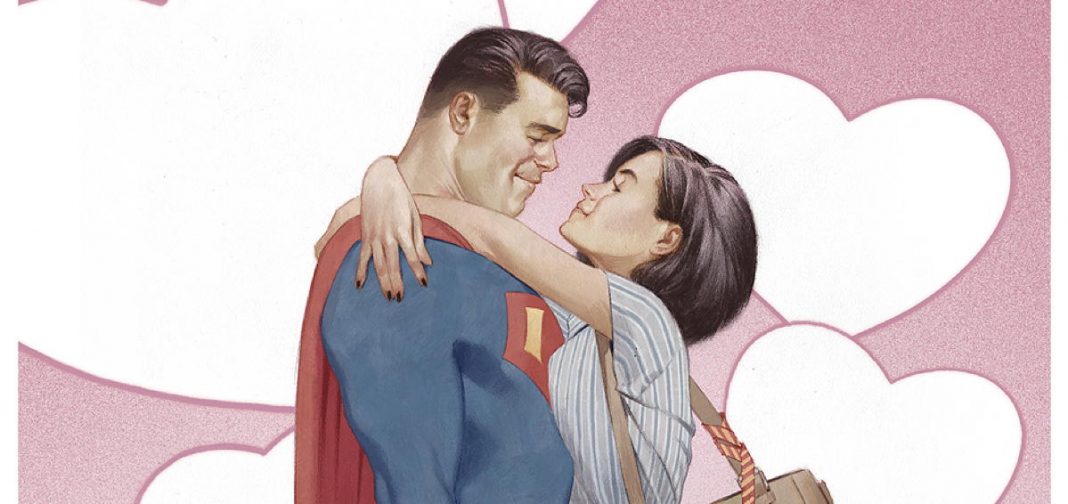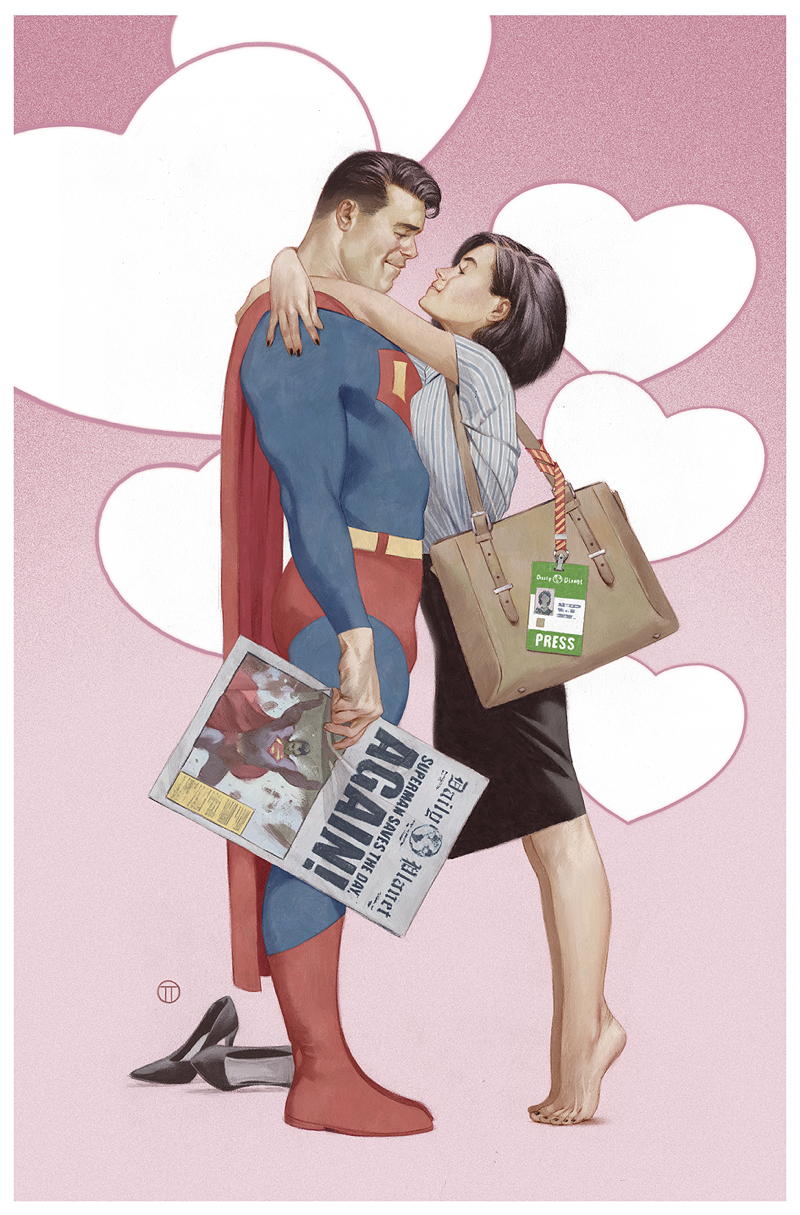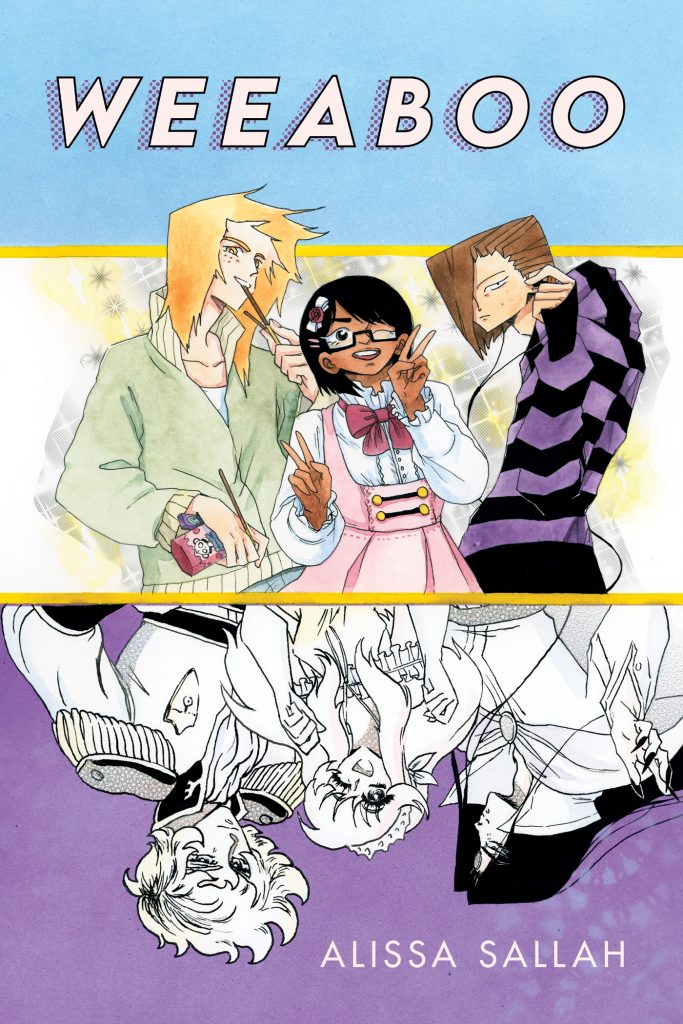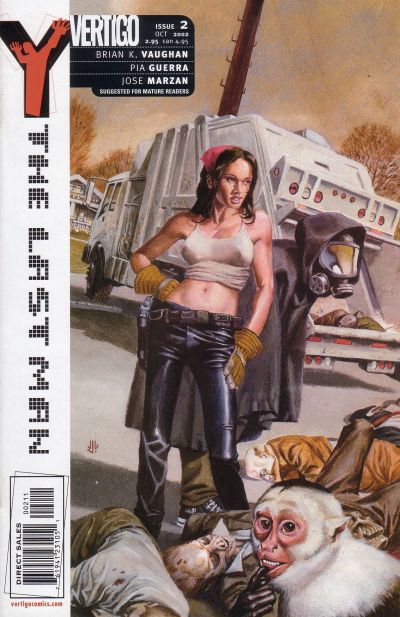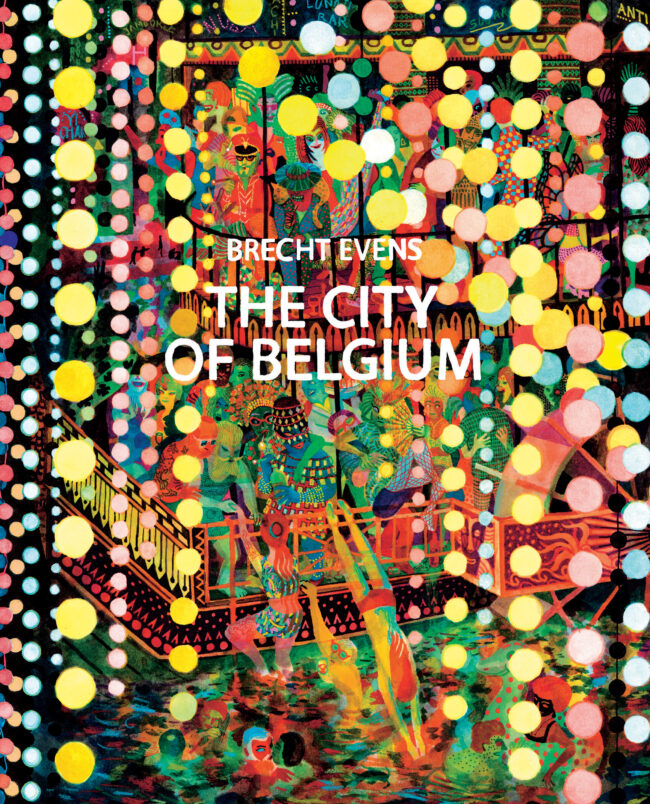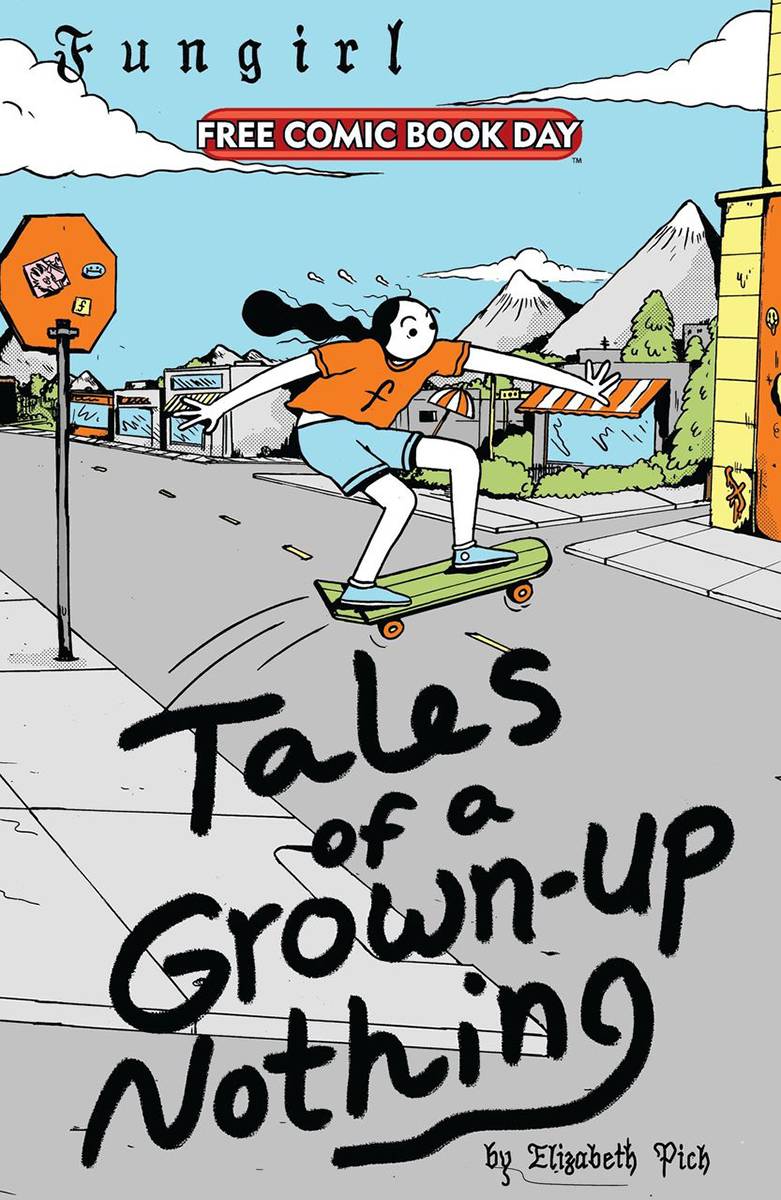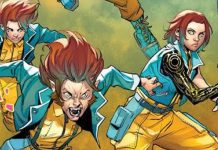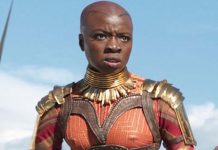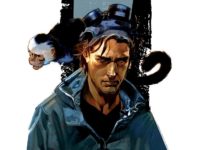§ Nice Art: Julian Totino Tedesco’s variant cover for Action #1035.
§ Via the MyComicShop.com newsletter, Conan Saunders reveals that his father, legendary comics retailer Buddy Saunders, has suffered a stroke.
We in the Saunders family were in for a big surprise last week–Buddy had a stroke last Thursday morning. Fortunately we caught the stroke early and the ambulance was able to get him to the hospital quickly. The stroke occurred in the left side of his brain, which controls movement on the right side of his body. He’s been in the hospital since then and has been getting good care. My mom Judy, who is a saint and an angel in human form, has been with him every day. The current hospital policy only allows one visitor per day due to Covid concerns, although the hospital kindly bent the rules a little and let me in to see him with her the first day. In the few short days since he had the stroke, Buddy has already started to show good improvement. The first day he could only wiggle the toes on his right foot, and now he’s already able to walk across the room. He will have plenty of physical therapy and occupational therapy ahead of him to develop new neural pathways and regain greater control over the muscles that were affected by the stroke. He’s mentally sharp and is in good spirits, and has been cracking a few jokes with my mom and me and the hospital staff.
Wishing Buddy a speedy recovery!
§ Big read alert: Augie De Blieck rethinks the Digital Comic Book “Collections.” He might need to make some adjustments now that ComiXology and Amazon are more integrated, but maybe the new app will help sort this?
The entire system needs a complete rethinking: Publishers need to reconsider how they sell comics digitally. Until that day comes, the Comixology interface needs an update that I think could help comic readers, especially newer ones. The root of the problem, as always, is that Digital Comics are still made with protectionism towards the Direct Market foremost in the publishers’ minds. They’re afraid to do anything differently that might cut into DM sales, no matter how much it harms digital comics or the potential to find new audiences for comics. That includes formatting as well as pricing. Combine that with a publisher workflow (dare I say “pipeline”?) that emphasizes efficiency over logic. They take the final digital package created for the trade paperback and just export that to the digital comics format, as well. But shouldn’t the digital comic be a different package? Do the same lessons of shelving at stores make sense for the virtual shelves of a digital bookshelf?
§ I missed the news – but Rob Salkowitz did not – that a big Chinese company is also investing in mobile comics:
Kuaikan, the largest mobile comics app in China, just got a major capital infusion, closing a $240 million financing deal led by CCB International, Tencent, One Store, Coatue and Tiantu Capital. The deal values the company at $1.25 billion and represents yet another huge financial bet on the mobile-first digital comics industry, following Korean tech giant Kakao’s acquisition of US-based Tapas for $510 million earlier this year. Like Tapas and Webtoon, another Korean-based leader in the space, Kuaikan delivers a vast library of content developed by professional creators and a community of fans. It was founded in 2014 by cartoonist Anni Chen, and grew quickly as one of the country’s leading sites for comics, anime art and fiction.
§ Speaking of Salkowitz, he may wish he had not written this piece for ICv2: Who’s a Creative Professional in the Comics World? The Answer is Getting More Complicated. The piece received swift and immediate blowback on Twitter, even from Derf Backderf, for suggesting webcomics were more amateurish in execution than Big Two comics. I think what he was trying to get at is that UGC is mostly done for free and that is its own set of problems. But anyway, people spend all day on Twitter for free, too…or do they?
§ Back in the day “weeaboo” was a term for people who took Asian culture maybe too seriously, and now there’s an upcoming graphic novel about this by Alissa Sallah, and here’s an interview about it!
Did you ever find yourself facing backlash or having to question your own interests over the years, and how did that shape how you approach your hobbies?
Totally, I feel like backlash against who you are is a part of adolescence that all kids growing up who defy any roles or categories they’re placed into experience. While backlash can often be from a place of othering or bullying, it isn’t always a bad thing. Sometimes a clashing of other people’s ideas can be a needed part of growth. It forces you to reflect on yourself and view your actions or who you are from another perspective. How people respond to backlash is where I wanted to take the focus. Part of growing up for me personally was learning to embrace who I am even when faced with the objections of others. Finding the confidence to wear a big, dramatic costume in public even while the people of your stifled midwestern town look at you and jeer is just one small step toward personal freedom. But sometimes another, but equally important step is listening to the grievances from people you care about and being able to confront where you might be ignorant. I guess that’s why they’re tough questions, because the answer isn’t the same for everything.
§ Alicia Keys will release a graphic novel based on her song “Girl On Fire” — but it will not be about a gender-swapped Human Torch. Not quite.
The 40-year-old singer has announced plans to put out the graphic novel, which will be based on her 2012 hit single by the same name, on March 1 next year. Alicia revealed the novel will tell the story of a 14-year-old girl named Lolo Wright, who discovers she has “telekinetic powers she never knew she had while protecting her brother from a cop who pulls a gun on him in a dangerous case of mistaken identities”. The book will be released alongside HarperCollins Publishers and co-author Andrew Weiner, and it is illustrated by Brittney Williams.
§ In 2002, Y the Last Man was just another take on the very well trodden trope of one sex or another disappearing, leaving the survivors to deal. Since then, we have learned that “one sex or another” doesn’t even begin to cover the spectrum of gender, and the long-delayed media adaptation (coming in less than two weeks!!!) has been updated to reflect reality. Trans writer Charlie Jane Anders was part of the writer’s room for Y and has written Everything I Learned From Working on Season One of Y: The Last Man for their newsletter. It’s an illuminating piece.
Once I joined the staff, I realized that we needed other trans voices to be heard in the making of this show. So early on in the process, I asked a trans man, Aydin Olson-Kennedy with the L.A. Gender Center, to come and talk to the writer’s room about his life and experiences. Our bookcase of resource materials included a lot of books by trans authors. And as I already mentioned, I encouraged Eli to bring in Nick Adams from GLAAD to collaborate with us. Nick ended up being pretty heavily involved in shaping our first season, to make sure that we didn’t include anything in our episodes that would inadvertently suggest that chromosomes = destiny.
§ Speaking of newsletter, those wonderful folks at SMASH PAGES have compiled The Comic Newsletter Directory:
We’ve set out to create a directory of the suddenly immensely popular comic creator newsletter, and this is the result. This is an ongoing, constantly updated resource, so please check back often for new additions.
Huzzah! Bookmark.
§ Cleaning out the old links drawers, found this great conversation between Joe Ollmann and Brecht Evens at TCJ. I could do a whole year of Nice Art with nothing but Brecht Evens pages!
Joe Ollmann: Is it fair to call The City of Belgium a mental health book or a recovery book? There are two characters who are in the midst of mental health crises. Why was that something you wanted to explore?
Brecht Evens: I started writing it just after my own recovery from a mental health crisis, so the recovering was done, thanks to pills and the love of loved ones. I didn’t find art to be a huge help when I was in real trouble. About as useful as a cat when you’re drowning. Patiently waiting by the waterside, ready to be petted and fed once you get out. But the crisis has been good for the art though. It gave me another lens through which to look at people and life in the city, got me into unexpected places and conversations, and these experiences fuel a large part of the book. I think ‘mental health book’ sounds way more didactic than it is, so let’s say that’s unfair, before it sticks.
The conversation mentions my long ago coverage of MOCCA in 2011, which included a bunch of cartoonists standing in the street drinking…and getting ticketed for it. First off, where did I get off trying to pass such shitty photography as legit? Second, the idea of writing about people drinking and making merry on the streets openly seems so long ago. That Evens is now dealing (successfully) with his own mental health is kind of where we’re at now. Wishing him all the best and lots more beautiful books.
§ Speaking of now, Rose City Comic Con will now require vaccination or negative tests to attend;
The annual Rose City Comic Con is returning to Portland this September, and all guests will be required to have their COVID-19 vaccinations or show a negative coronavirus PCR test taken within two days of the event. The annual celebration of comics, pop culture, cosplay, celebrities, and more was postponed in 2020 due to the coronavirus pandemic. Now returning to the Oregon Convention Center, the Rose City Comic Con staff said they will abide by Metro’s requirement that every attendee must show proof of full COVID-19 vaccination or proof of a negative PCR COVID-19 test that was administered within 48 hours of arrival.
§ A few weeks back some local news station ginned up a report about an adult comic being handed out to children for Free Comic Book Day. While I do question the efficiency of selecting adult material for the day when so many new readers may be picking up comics, the publisher, Silver Sprocket, responded in a YouTube post:
First, we are truly bummed out about and regret the misunderstanding over our book being for adults. We love our libraries and were not trying to pull a fast one or get anyone in trouble. “Fungirl: Tales of a Grown Up Nothing” by Elizabeth Pich followed all of the rules for mature content and was very clearly marketed as such. If we do something like this again, the cover art will boldly say “adults only” to further avoid confusion. That being said, there is no universe in which this book could be considered “pornographic.” Yes, there is a very brief and very vanilla sex scene, but it isn’t the point of the book and not that sexy. I assure you, this book will not lead to sexual arousal, though it is smart and funny and will make you think and laugh. I respect a parent’s agency in curating what is appropriate for their child, but on a personal level, the offending page is far less offensive than the violence and power fantasies that are pervasive in mainstream comics, which I don’t think should be “censored” either, but we as a society really need to get our priorities in order. Lots of literature in the library has sex in it, without warning labels on the covers. The simple drawings in this book will not be hurting anyone.
§ On Marvel.com a personal essay by Hussein Rashid about identity and comics.
Born in Manhattan, and growing up in Queens, New York, I wasn’t different. Everyone was different to everyone else. That was the norm. Then we moved to Long Island, and it was a different beast. Suddenly, my status as a “statistic” was glaring. In our new home, you needed to fit into categories, and people didn’t know or understand my categories. Thankfully, I found my escape in the world of speculative fiction that comics offered me. When I first picked up comics in the 80s, I wasn’t thinking about representation. I was more focused on learning how to be like the Super Heroes I loved, different. Like most folks then, looking for something similar, I found the X-Men. Cyclops is still my man, and the fact that Jay Edidin recently made him canonically neuroatypical makes him even more dear to me, especially as someone who was diagnosed with ADD as an adult.
§ Another day, another profile of Tony Leung, with more great photos. Leung’s portrayal of the villain in Shang Chi and the Legend of the Ten Rings will be quite a topic as more people see this movie. And yes, I am obsessed with Tony Leung. Why aren’t you?
“Frankly, I couldn’t imagine someone in the real world with superpowers,” he says over Zoom one recent evening from his home in Hong Kong. “But I can imagine someone like him who is an underdog, who is a failure of a father.” At ease in a white T-shirt, a slender golden chain visible underneath, he has the ready and easy smile of a boy, a collection of elegant porcelain urns and vases arranged on a shelf behind him. He says he understood that Wenwu was ultimately driven not by evil but by a love for his children, which lent him a touch of humanity. “On the one hand,” Leung says, “he’s a bad father, but on the other, I just see him as someone who loves his family deeply.” And, he adds, “I don’t think he knows how to love himself.”
§ Damn it, 2004 was a great year for movies.


